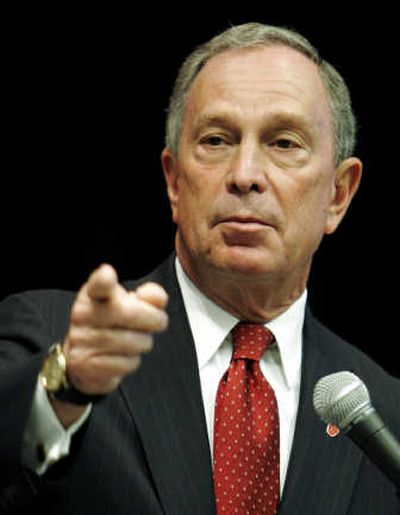Bloomberg drops GOP affiliation

WASHINGTON – New York Mayor Michael Bloomberg abruptly left the Republican Party on Tuesday, declaring himself free of a “rigid adherence” to ideology and stoking speculation that he will use his multibillion-dollar fortune to mount an independent bid for the White House.
The founder of the Bloomberg financial media empire has repeatedly denied interest in the presidency. At a conference Tuesday in which he attacked partisanship in Washington, he said, “I plan to be mayor for the next 926 days.”
But he has refused to rule out a run for the presidency even as he has discussed the possibility privately with close advisers and begun to travel around the country, including a trip to the home of the nation’s first primary, New Hampshire.
In a statement posted on the official New York City Web site late Tuesday, Bloomberg said his future plans “haven’t changed” and that abandoning the Republican banner would better reflect his approach to governance. Bloomberg was a longtime Democrat before shifting his allegiance to the GOP prior to his first mayoral run in 2001.
Bloomberg, 65, is prepared to spend more than any candidate has ever spent in a presidential campaign. Forbes lists his net worth at $5.5 billion, although estimates of his wealth range as high as $20 billion. Bloomberg has reportedly told those closest to him that he would spend as much as much as half a billion if he ran for the presidency, and some reports have suggested he could spend double that amount.
That would exceed by tenfold the amount spent by former businessman Ross Perot in 1992 when he captured 19 percent of the popular vote. In his 2005 re-election campaign, Bloomberg spent $85 million, four times what his Democratic opponent spent.
The Rev. Al Sharpton, a former Democratic presidential candidate and fellow New Yorker, likened Bloomberg’s decision to the often mysterious ways of teenage romance.
“A girl in high school catches you looking at her and she starts wearing nice dresses,” Sharpton said. “It doesn’t mean she’s gonna date you. But she’s at least teasing you, so it really increases your hope. This is a serious tease.”
Asked whether he would endorse Bloomberg if he ran, Sharpton said: “I’m not saying I would necessarily endorse him. But I wouldn’t rule it out either.”
Bloomberg was in California Tuesday for an afternoon speech and later held a series of private meetings, a spokesman in his office in New York said. On Monday, he gave a speech at the Northern California headquarters of Google, where he playfully batted away questions about a presidential candidacy.
At the Google event, he declined to comment on reports that he had privately discussed a possible presidential campaign with former Democratic Sen. David Boren, of Oklahoma.
None of the representatives for the major presidential candidates from either party would comment Tuesday. But political strategists said the mayor’s announcement will force the leading Republican and Democratic candidates to reassess their strategies.
“Now both parties will have to address what a Bloomberg candidacy means for them,” said New York-based Democratic consultant Hank Sheinkopf, who said Bloomberg’s success as a businessman and mayor could offer voters a starkly different choice from the major parties. “What he may represent is a break from both political parties.”
One consultant predicted that a Bloomberg candidacy could hurt the Republicans, including Bloomberg’s predecessor, former New York Mayor Rudolph Giuliani. “The market for billionaire businessmen is basically with soft Republican voters, and so he is likely to help the Democrats if he runs,” the consultant said.
Others have suggested that Bloomberg will appeal to independent voters who backed Democrats in droves in the 2006 midterm elections.
Bloomberg’s announcement takes him a significant step closer to an independent candidacy. But those familiar with his thinking say no decision is likely to come until early next year, after it’s clear who the two major party candidates are going to be.
His advisers say he is likely to jump in only if a series of factors align properly: general dissatisfaction in the country, a willingness to vote for an independent and the relative standing of the two candidates chosen by the major political parties early next year.